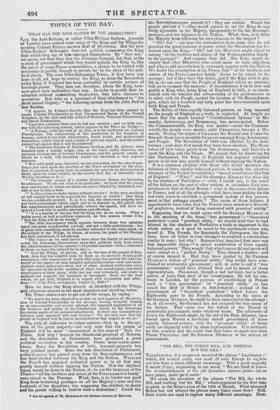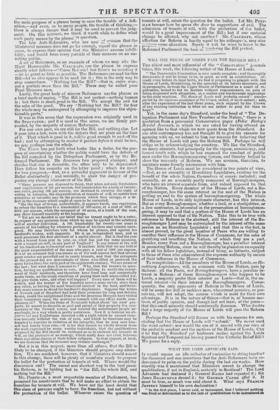"THE BILL, THE WHOLE BILL, AND NOTHING BUT THE BILL."
TALLEYRAND, it is supposed, invented the phrase "Legitimacy ;" which, for several years, was used all over Europe to express not less than a dozen different meanings. With a great majority it meant Peace; expressing, in one word, "We are tired of war— the re-establishment of the old dynasties secures peace—let us have peace, coute Ted coute." We claim the invention of the phrase "The Bill, the whole Bill, and nothing but the Bill ;" which appeared for the first time in print in the SPECTATOR of the 12th of March. What educated Briton has not uttered the phrase many times since then? Still, these words are used to express many different meanings. Now, the main purpose of a phrase being to save the trouble of a defi- nition,—and even, as to many people, the trouble of thinking,— there is always danger that it may be used to pervert the jillg- inent. On this account, we think it worth while to define what each party means by the phrase question. The late Anti-Reformers, who are nowf nniMon that the Ministerial measure does not go far enough, repeat the phrase in scorn, to express their opinion that the Ministers assume infalli- bility, and would force every particle of their measure on an un- willing public. A set of Reformers, as an example of whom we may cite the Right Honourable Mr. CALCRAFr, use the phrase to express shortly what follows—" Curse Reform ! but there's no resisting it —let us grant as little as possible. The Reformers are mad for this Bill—let us also appear to be mad for it ; this is the only way to stop somewhere. Nothing but the Bill !—that is, entre nous, not a particle more than the Bill." These may be called your Final Measure men.
Lastly, the great body of sincere Reformers use the phrase as a brief mode*of saying, "The Bill is not perfect—nothing human is ; but there is much good in the Bill. We accept the evil for the sake of the good. We cry Nothing but the Bill!' for fear the whole may be endangered by attempting to improve the objec- tionable parts." It was in this sense that the expression was originally used in the SPECTATOR; and it is used in this sense, we are firmly per- suaded, by the majority of sincere Reformers. For our own part, we are still for the Bill, and nothing else. Let it pass into a law, even with the defects that are plain on the face of it. That which is good in it, will be good enough to cast off the bad ; and by attempting to render it perfect before it shall be law, we may perhaps lose the whole. The Tinzes has put forth what looks like a feeler, for the pur- pose of ascertaining whether the public would have the defects of the Bill remedied by the Delegation Parliament, or by the Re- formed Parliament. He discusses two proposed changes ; and decides that one is desirable, the other only to be deprecated. Here follow his remarks on the latter point ; which we insert for two purposes,—first, as a powerful argument in favour of the Ballot abstractedly ; and secondly, to show the danger of pro- posing any change whatsoever of the Bill.
" Many persons are disposed to think, that when not only freeholders and copyholders of 10/. per annum, but leaseholders for a term of twenty- one years, paying 50/. per annum, are destined to exercise the right of voting in counties, the disqualification of tenants at wad, no matter how extensive or valuable may be the premises which they occupy, is a de- fect in the measure which ought at once to be corrected.
"On the face of things, undoubtedly, it appears harsh, nay capricious, to refuse the franchise to a leaseholder of 500 acres, at a rent of 600/. or 800/. per annum, while the occupant of 50 acres, at a tenth of the sum, can show himself manfully at the hustings.
"Yet are we decided in our belief that no tenant ought to be a voter, in respect of any premises from which he may be ejected at the arbitrary will of another individual. A 501. leaseholder for twenty-one years is secure of his holding for whatever portion of his term may remain unex- pired. He may therefore vote for whom he pleases, and against his landlord's wishes, with impunity. He is an independent man, and as such possesses the first attribute of a useful elector. But is that the case with a tenant from year to year' or, what has just the same meaning, with a tenant-at-will, in any part of England ? Is any tenant at the will of his landlord an independent man? It matters little that we are told of the great respectability of the man who pays a rent of 500/. per anpum. It is of no moment that you assure us of the well-known fact that several great estates are parcelled out to yearly tenants, and that the occupants at the present day are descendants of those who tilled or pastured the same farms from the early part of the eighteenth century. We are aware of the fact ; but what does it amount to ? Why, that the tenants in ques- tion, having: no qualification to vote, did nothing to excite the resent- ment of their landlords, and therefore have lived long and contentedly under them, on the single condition of paying their rent when called for. But give them votes, and what will happen ? Every man of them will be a slave, and the tenant of five hundred acres a more servile slave than any other, as having; the most beneficial interest in the land, and there- fore more reason to dread his landlord's displeasure. Suppose the voters of Newark and of Stamford had held their premises for long and definite terms, could the enlightened Duke and the generous Marquis have visited their vengeance upon the mutinous tenants with any effect worth com- plaining of ? When the Duke of Newcastle talked about his own' pro- perty, he meant to describe as part and parcel of that property the con- sciences of the Newark voters, and treated the unfortunate people ac- cordingly, in a way which is pretty notorious. Now it is because we ob- ject to see any Englishman invested with a right which he cannot exer- cise honestly without the risk of ruin, and which he therefore may be tempted to exercise in violation of his integrity, that he may save him- self and family from ruin,—it is for that reason we wholly dissent from the wish expressed by many worthy individuals, that the qualifications proposed by the Bill should be enlarged so as to embrace the tenants at will, on the pretence of an analogy, which really does not exist, between them and other classes of their fellow-subjects. In that respect, at least, we are desirous that the measure may remain unchanged."
But it is in this respect, more than all others, that the Bill is likely to be changed, if the Ministers should propose any altera- tion. We are confident, however, that if Ministers should assent to this change, there will be plenty of members ready to propose the ballot for the protection of tenants at will. Where would the discussion end? The surest and shortest way to the best possi- ble Reform, is by holding fast to "the Bill, the whole Bill, and nothing but the Bill." Mr. PORTMAN, a most respectable member of Parliament, has promised his constituents that he will make an effort to obtain the franchise for tenants at will. We have not the least doubt that this class of persons ought to have the franchise, but not without the protection of the ballot. Whoever .raises the question of tenants at will, raises the question for the ballot. Let Mr. PORT- mAN beware how he opens the door to suggestions of evil. The admission of tenants at will, with the protection of the ballot, would be a great improvement of the Bill ; but if one material change be allowed, why not another ? Mr. CALCRAFT, whose affection for Reform is hardly equal to his colleague's, may also same alteration. Surely it will be wiser to leave to the
-
• C Reformed Parliament the task oi n-er the Bill perfect,



























 Previous page
Previous page